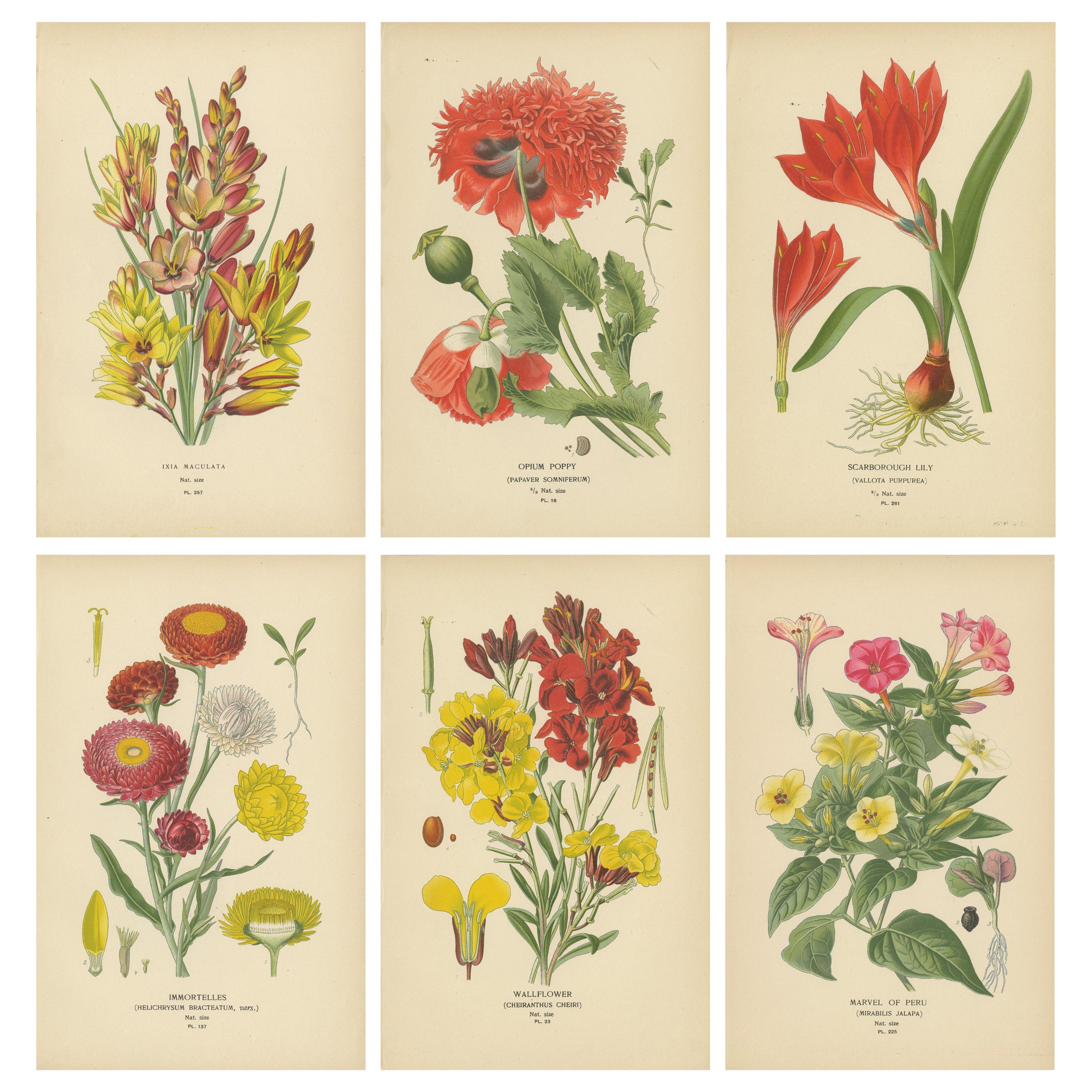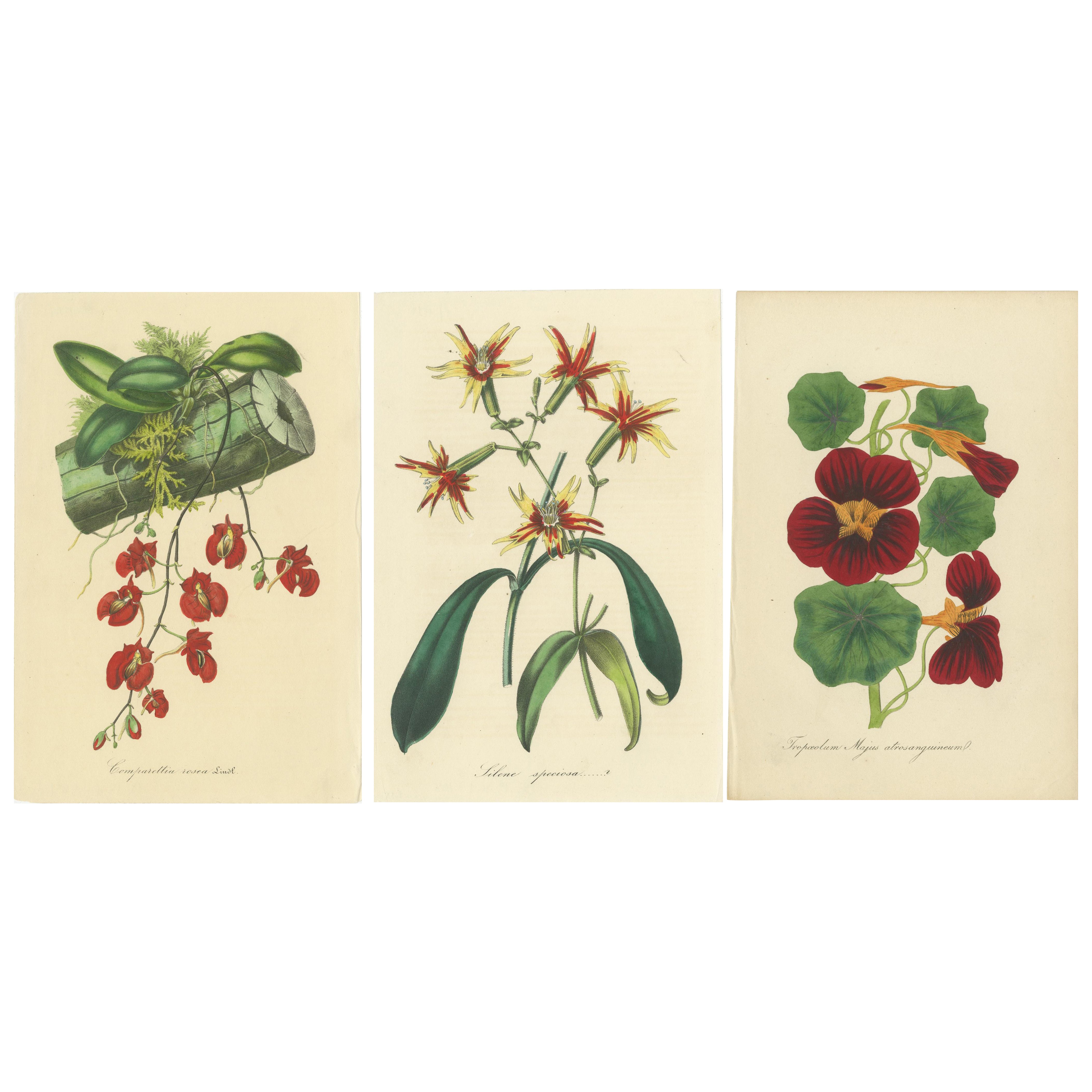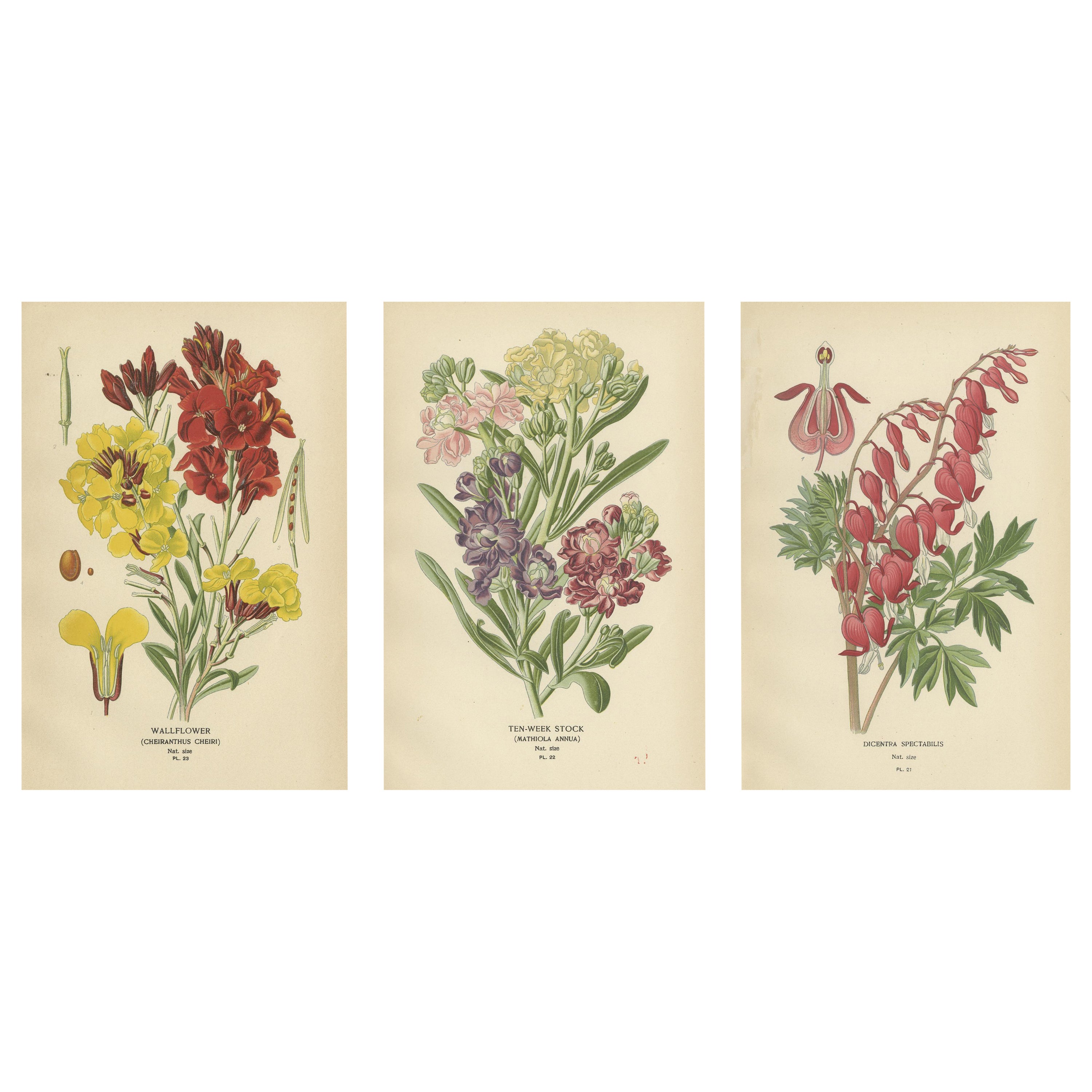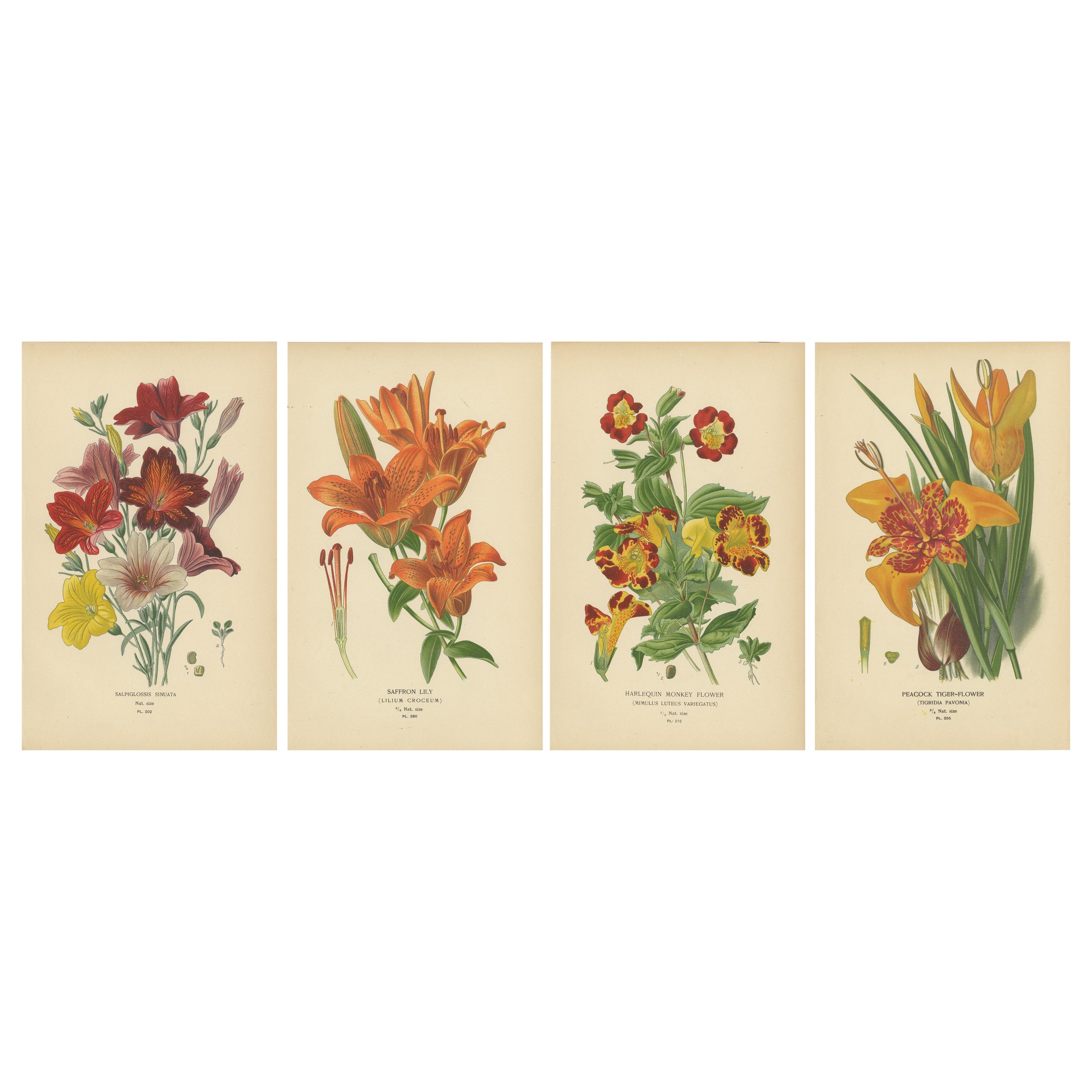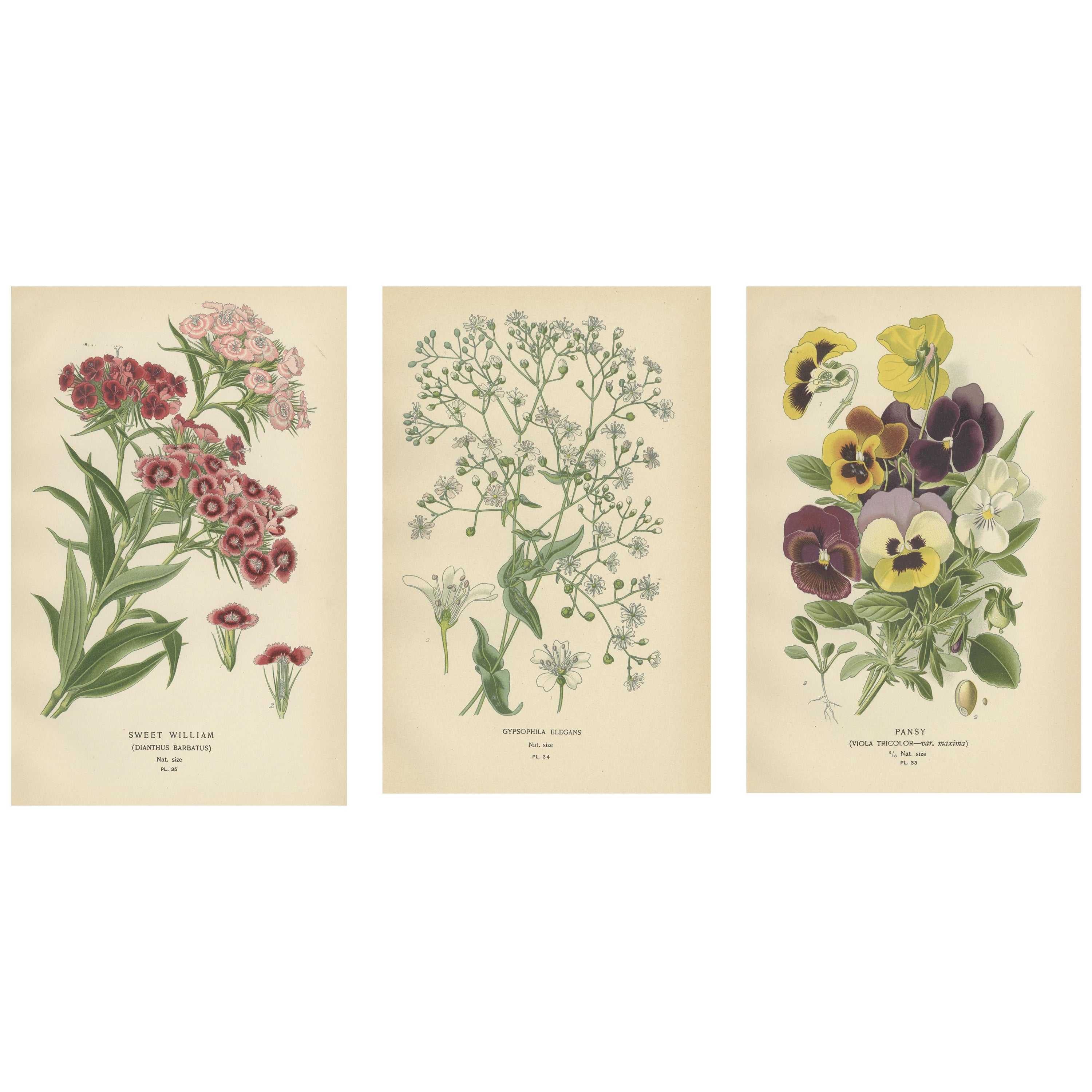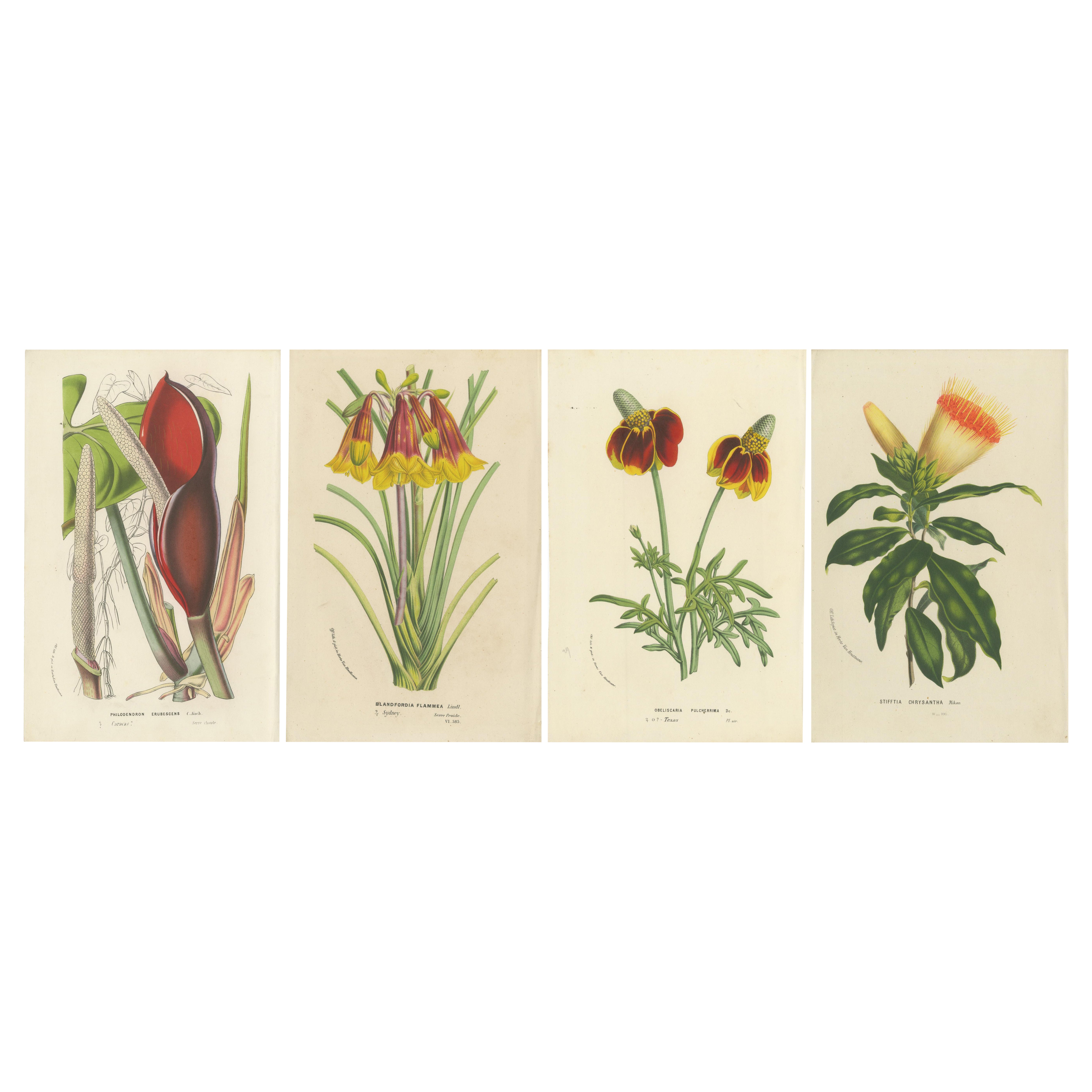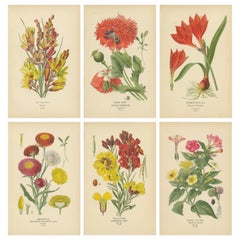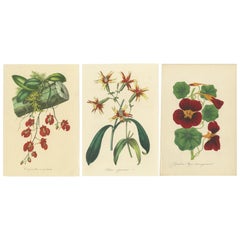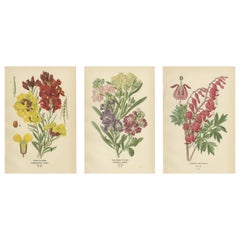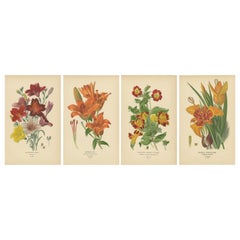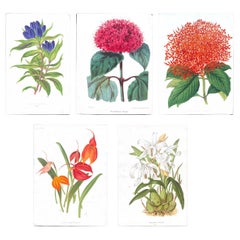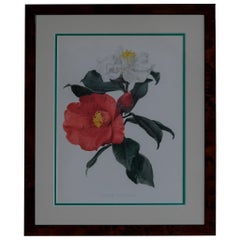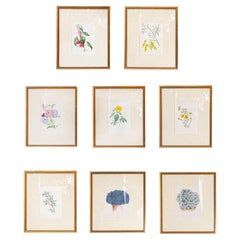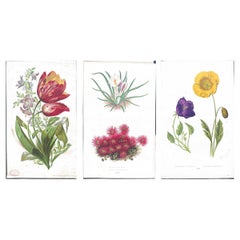Items Similar to Vibrant Blooms: A Collection of Exquisite Chromolithographs from Revue Horticole
Want more images or videos?
Request additional images or videos from the seller
1 of 7
Vibrant Blooms: A Collection of Exquisite Chromolithographs from Revue Horticole
$344.34per set
$430.42per set20% Off
£254.91per set
£318.64per set20% Off
€288per set
€360per set20% Off
CA$476.48per set
CA$595.60per set20% Off
A$525.30per set
A$656.63per set20% Off
CHF 274.82per set
CHF 343.53per set20% Off
MX$6,444.51per set
MX$8,055.64per set20% Off
NOK 3,459.47per set
NOK 4,324.34per set20% Off
SEK 3,235.15per set
SEK 4,043.94per set20% Off
DKK 2,193.81per set
DKK 2,742.26per set20% Off
About the Item
These chromolithographs, originally published in the *Revue Horticole*, represent some of the finest examples of 19th-century botanical art, showcasing an exquisite level of detail and vibrant colors. The prints were crafted by the artist Godard and chromolithographed by G. Severeyns, a prominent Belgian lithographer renowned for his mastery of the chromolithographic process. Each image captures the essence of the plants, combining scientific precision with artistic expression.
The *Revue Horticole* was one of the most important horticultural journals of the 19th century, focusing on the latest developments in horticulture, botany, and garden design. The use of high-quality chromolithographs to accompany the articles elevated the publication, making it a highly respected source of botanical knowledge. The chromolithographs were not only educational but also aesthetically appealing, making them popular among gardeners, botanists, and collectors alike.
Detailed Descriptions of Each Plant
1. Gladiolus Hybrides de Lemoine
- English Name: Lemoine's Hybrid Gladiolus
- Description: This print features several varieties of hybrid gladiolus, known for their tall spikes of large, colorful blooms. Gladiolus is native to South Africa, but French nurseryman **Victor Lemoine** hybridized them to create unique varieties. In the print, each flower shows off a different color combination, including yellow, pink, purple, and red. The varieties listed include 'Pactole,' 'Ferdinand de Lesseps,' 'Émile Gallé,' and 'Marquis de Saporta,' each named after prominent figures of the time.
2. Œillets Grenadins (*Dianthus caryophyllus*)
- English Name: Grenadin Carnations
- Description: This print depicts Grenadin Carnations, a variety of *Dianthus caryophyllus* known for its compact, double-flowered heads in vibrant red hues. These carnations were popular in Europe for their spicy fragrance and long-lasting blooms. Often grown for decorative and ceremonial purposes, carnations symbolize fascination and distinction.
3. Zinnia du Mexique Hybrides Variés (*Zinnia elegans*)
- English Name: Mexican Hybrid Zinnia
- Description: The Mexican Hybrid Zinnia is depicted in an array of colors, from deep reds to oranges and yellows. *Zinnia elegans* is native to Mexico and was cultivated extensively in European gardens for its showy, daisy-like flowers. The hybrid varieties, as shown in this print, are particularly admired for their vibrant colors and ability to thrive in hot, dry conditions.
4. Bonarea kalbreyeri
- English Name: Kalbreyer's Bonarea
- Description: This exotic vine, *Bonarea kalbreyeri*, produces striking tubular flowers in vibrant red and yellow. Native to Colombia, it was introduced to European greenhouses in the 19th century. The plant’s pendulous clusters of colorful flowers make it a standout ornamental species, ideal for warm, temperate climates or greenhouse cultivation.
About the Makers
Godard (Artist)
Godard was a skilled botanical illustrator known for capturing the beauty and complexity of plants. His attention to detail and ability to render flowers with both scientific accuracy and artistic elegance made him a sought-after illustrator in horticultural publications like the *Revue Horticole*. His work not only served an educational purpose but was also admired as fine art.
G. Severeyns (Chromolithographer)
Severeyns was a renowned Belgian chromolithographer whose workshop produced some of the most exquisite botanical chromolithographs of the 19th century. Based in Brussels, he was known for his ability to produce richly detailed, multi-colored prints that faithfully reproduced the vibrant hues and intricate details of the plants. His work is often associated with prestigious horticultural publications, and he collaborated with many prominent botanists and horticulturists of his time.
About the *Revue Horticole*
The *Revue Horticole* was a leading French horticultural journal first published in 1829. It provided valuable information on plant cultivation, landscape design, and the latest horticultural innovations. What set it apart was the inclusion of high-quality botanical illustrations, particularly chromolithographs, which offered readers an accurate representation of new and exotic plant varieties being introduced into European gardens.
As the horticultural industry grew during the 19th century, the *Revue Horticole* became an essential resource for professional gardeners, botanists, and plant enthusiasts alike. The detailed descriptions, coupled with the vivid chromolithographs, made the publication a comprehensive guide to the world of plants, helping to disseminate knowledge of newly discovered species and innovative hybridizations.
The Chromolithography Technique
Chromolithography was a method of making multi-colored prints that revolutionized printing in the 19th century. Unlike earlier methods that relied on hand-coloring, chromolithography allowed for mass production of colored images by using multiple lithographic stones, each inked with a different color. The process was labor-intensive, as each color required its own stone, but the results were highly accurate and vibrant.
Botanical prints, like those in the *Revue Horticole*, benefitted greatly from this technique because it allowed artists to replicate the true colors of plants in exquisite detail. Chromolithography became the preferred method for botanical illustrations, and prints produced by experts like Severeyns are still highly valued by collectors and art historians today for their craftsmanship and beauty.
Conclusion
These prints from the *Revue Horticole* exemplify the high standards of botanical illustration in the 19th century. The combination of Godard’s artistic talent and Severeyns' mastery of chromolithography resulted in stunning, lifelike representations of plants that were both educational and aesthetically pleasing. The journal's legacy lives on in the rich visual and botanical history it helped document, making it a cornerstone of 19th-century horticultural literature.
- Dimensions:Height: 9.85 in (25 cm)Width: 6.5 in (16.5 cm)Depth: 0 in (0.02 mm)
- Sold As:Set of 4
- Materials and Techniques:
- Period:
- Date of Manufacture:circa 1880
- Condition:Condition: Very good, given age. General age-related toning and/or occasional minor defects from handling. Please study scan carefully.
- Seller Location:Langweer, NL
- Reference Number:Seller: BG-13761,-94 BG-13761-100, etc1stDibs: LU3054341458832
About the Seller
5.0
Recognized Seller
These prestigious sellers are industry leaders and represent the highest echelon for item quality and design.
Platinum Seller
Premium sellers with a 4.7+ rating and 24-hour response times
Established in 2009
1stDibs seller since 2017
2,609 sales on 1stDibs
Typical response time: <1 hour
- ShippingRetrieving quote...Shipping from: Langweer, Netherlands
- Return Policy
Authenticity Guarantee
In the unlikely event there’s an issue with an item’s authenticity, contact us within 1 year for a full refund. DetailsMoney-Back Guarantee
If your item is not as described, is damaged in transit, or does not arrive, contact us within 7 days for a full refund. Details24-Hour Cancellation
You have a 24-hour grace period in which to reconsider your purchase, with no questions asked.Vetted Professional Sellers
Our world-class sellers must adhere to strict standards for service and quality, maintaining the integrity of our listings.Price-Match Guarantee
If you find that a seller listed the same item for a lower price elsewhere, we’ll match it.Trusted Global Delivery
Our best-in-class carrier network provides specialized shipping options worldwide, including custom delivery.More From This Seller
View AllFloral Treasures: 19th-Century Chromolithographs from the Botanical Collection
Located in Langweer, NL
The following six chromolithographs are part of a collection published in 1896, created by Désiré Bois and Edward Step. They illustrate botanical subjects with remarkable attention t...
Category
Antique 1890s Prints
Materials
Paper
$516 Sale Price / set
20% Off
Vibrant Botanical Chromolithographs: A Showcase of Exotic Blooms, 1875
Located in Langweer, NL
The following botanical prints are from a collection illustrated by Louis Benoît Van Houtte.
Louis Benoît Van Houtte was a prominent Belgian horticulturist and nurseryman. He publis...
Category
Antique 1870s Prints
Materials
Paper
$315 Sale Price / set
20% Off
Charming Florals of the Victorian Era: A Collection of Antique Prints, 1896
Located in Langweer, NL
"Charming Florals of the Victorian Era: A Collection from 'Favourite Flowers of Garden and Greenhouse'"
Step into the enchanting world of Victorian horticulture with "Charming Flora...
Category
Antique 1890s Prints
Materials
Paper
$325 Sale Price / set
20% Off
Free Shipping
Victorian Garden Gems: Exotic Flowers from 1896-97 Illustrated Series
Located in Langweer, NL
Victorian Garden Gems: Exotic Flowers from 1896-97 Illustrated Series
Description of the Antique Chromolithographs from "Favourite Flowers of Garden and Greenhouse"
Published: 1896...
Category
Antique 1890s Prints
Materials
Paper
$468 Sale Price / set
20% Off
Victorian Vivids: A Floral Collection from Edward Step's Masterworks, 1896
Located in Langweer, NL
"Victorian Vivids: A Floral Collection from Edward Step's Masterworks"
Discover the allure of "Victorian Vivids," a meticulously assembled trio of antique botanical prints from Edwa...
Category
Antique 1890s Prints
Materials
Paper
$325 Sale Price / set
20% Off
Free Shipping
Flora Illustrated: A Collection of 19th Century Botanical Art, Published c.1875
Located in Langweer, NL
The prints depict various botanical species, each illustrated with detailed attention to the morphology of the plants, including leaves, flowers, and sometimes fruits or seeds. These...
Category
Antique 1870s Prints
Materials
Paper
$325 Sale Price / set
20% Off
You May Also Like
Bignonia venusta – Antique Botanical Chromolithograph, 1880s
Located in Fukuoka, JP
A striking original botanical print from the 1880s, featuring Bignonia venusta, also known as flame vine or orange trumpet vine. This brilliantly colored illustration captures the dr...
Category
Antique 19th Century French Prints
Materials
Paper
Botanical Chromolithographs from: William Robinson's Flora & Sylva
Located in Kettering, GB
A collection of 16 original botanical chromolithograph print in colours from William Robinson’s 1903-1905 Flora & Sylva – A Monthly Review....
Category
Early 20th Century British Decorative Art
Materials
Paper
Victorian Floral Prints from The Museum of Flowers by Mary Elizabeth Rosenberg
Located in Atlanta, GA
English Victorian period floral prints from "The Museum of Flowers" by Mary Elizabeth Rosenberg, circa 1845, in custom giltwood frames under g...
Category
Antique 19th Century English Victorian Prints
Materials
Glass, Paper, Giltwood
Alpine Avens and Crocus – Original Hand-Colored Botanical Print, 1880s
Located in Fukuoka, JP
Alpine Avens and Crocus – Original Hand-Colored Botanical Print, 1880s
A charming original 19th-century botanical print featuring Alpine Avens (Acaena microphylla) and Crocus boryan...
Category
Antique 19th Century British Prints
Materials
Paper
Curtis Botanical Magazine Floral Prints c.1810
Located in Savannah, GA
Sydenham Teast Edwards
(British, 1768-1819)
A pair of botanical prints from Curtis’s Botanical Magazine, circa 1810 illustrated by Syd Edwards.
Plate 705: Porcelane Flowered Ge...
Category
Antique 1810s British Prints
Materials
Fabric, Glass, Wood, Paper
Original 1880s Botanical Print of Hæmanthus Kalbreyeri — Vibrant Antique Chromol
Located in Fukuoka, JP
A striking original chromolithograph from the 1880s, this botanical print features the dramatic Hæmanthus kalbreyeri, also known as the blood lily. Characterized by its intense red s...
Category
Antique 19th Century French Prints
Materials
Paper
